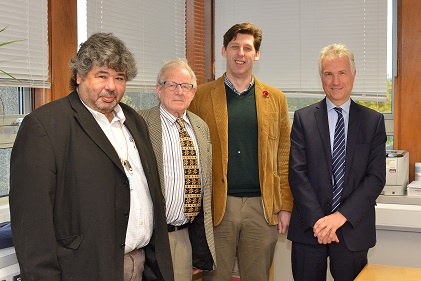Dr Ian Duncan, Member of the European Parliament, visited the University's Centre for Innovative Building Materials and Technologies to meet the research team developing innovative materials for low energy buildings.
Dr Duncan heard how this Centre in the School of Engineering has become a focus of activity and expertise in all aspects of building engineering, energy efficiency, materials and emerging technologies designed for a sustainable, low energy future. He met researchers and students, and the Head of the College of Physical Sciences and Vice-Principal for Research across the University, Professor Bryan MacGregor.
Dr Mohammed Imbabi, Director of the Centre, said: "I and my colleagues were very pleased to welcome Dr Duncan to the University, where he was able to visit with the 6C-LAB team and experience first hand our latest advances, including a new Calcium Sulfoaluminate (C$A) cement that embodies 40% less CO2 in its production than conventional Portland cements.
"We discussed the potential for cost-effective, large scale Carbon Capture and Utilisation (CCU), at the European scale and globally, that our experimental carbon negative cement (code named MHCH), made using waste desalination brine and CO2, has to offer, and will continue these discussions.
"We also had the benefit of discussing EU R&D and gaining useful perspective into the inner workings of the EU Parliament and the policy development process, where decisions ultimately percolate to the national level. Dr Duncan’s visit is we hope the first of many such visits and the basis of a strong, continuing relationship that enables us to contribute to the common good in Scotland and across Europe."
This is Dr Duncan’s second visit to the University this year. In May he was a panel member at the joint University-European Parliament event debating the implications for Scotland, the UK and Europe of the move towards the EC’s Energy Union strategy.
Ian Duncan is one of Scotland’s six MEPs. He is a geology graduate, and well versed in energy issues having been a policy analyst for BP's political affairs team in the late 1990s. During that time he worked on the company's strategy for emerging economic prospects in post-communist eastern Europe and the former Soviet Union.


